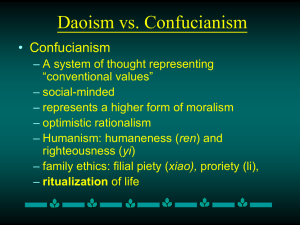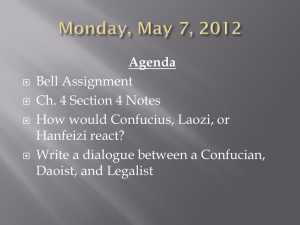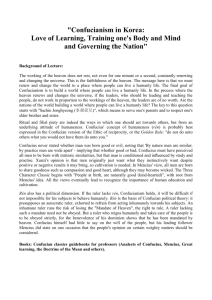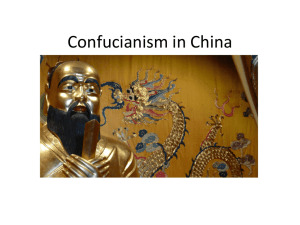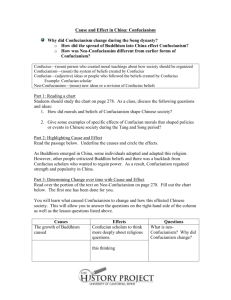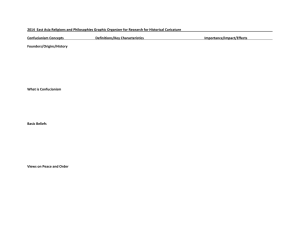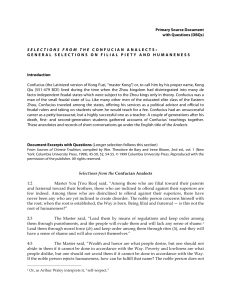Taoism vs. Confucianism
advertisement
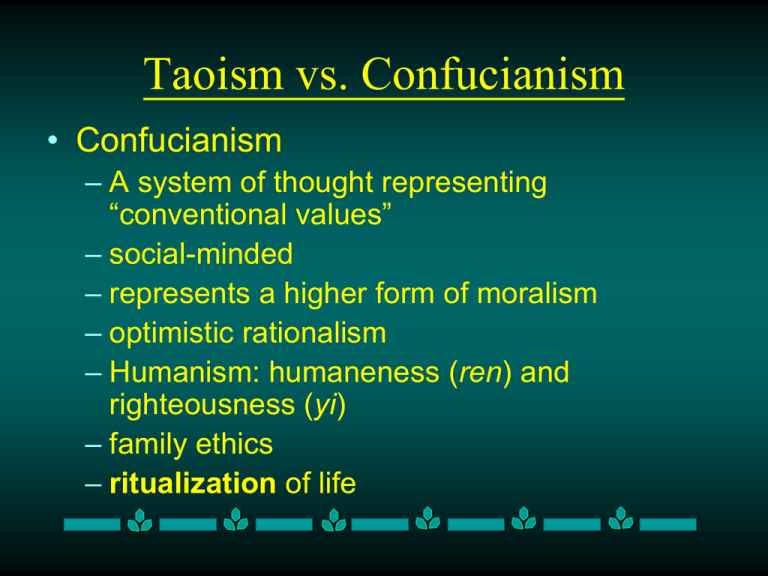
Taoism vs. Confucianism • Confucianism – A system of thought representing “conventional values” – social-minded – represents a higher form of moralism – optimistic rationalism – Humanism: humaneness (ren) and righteousness (yi) – family ethics – ritualization of life Confucian Views of Men and Society a sage ruler (sage king) is needed to keep social and political order Man is the center of this mundane world gentlemen (junzi) in gov’t to help rule the state good government brings about good society good individuals: humane and righteous rites and music: family is the base of society and state sacrifice and ritual rules and regulations ethics and order Education Humanism Taoism (based on TTC and CT) • Taoism/Daoism valued speculative thought • Questioned and sometimes repudiated Confucian values • rejected all other “artificial devices” of civilization • mocked ritual and propriety and decried group conventions • pessimistic about society • man is not capable of keeping order and safety in society • social man is a misguided being • • • • sought nature as refuge from man’s world scorned government, feared progress and civilization wary of technical skills naturalism Taoist Critique of Confucianism Confucian Virtues and regulations humaneness and righteousness like web-toes, extra-fingers, and other physical superfluity not a part of human nature; their existence is of no meaningful value not attributes of humanity because they were used to pursue honor and wealth, thus were the sources of greed along with the rites and music, caused confusions in the world what made people “superior men”; what caused people to twist their nature and die for Good person one who accepts the given characteristics and knows his/her own self Lao-tzu’s Critique of Confucianism • The person of superior integrity • Does not insist upon (display) his integrity. • The person of inferior integrity • Never loses sight of his integrity; • For this reason, he lacks integrity. • The person of superior integrity takes no action • Nor has he a purpose for acting • The person of superior humaneness takes action, • But has no purpose for acting • The person of superior righteousness takes no action • And has a purpose for acting • The person of superior etiquette takes action • But others do not respond to him; • • • • • • Whereupon he rolls up his sleves and coerces them When the Way is lost, afterward comes integrity. When integrity is lost, afterward comes humaneness. When humaneness is lost, afterward comes righteousness. When the righteousness is lost, afterward comes etiquette. Etiquette is the attenuation of trustworthiness, • And the source of disorder . • Foreknowledge is but the blossomy ornament of the Way, • And the source of ignorance. (TTC/ddj, 1/38) • Let there be a small state with few people, – Where military devices find no use; • Let the people look solemnly upon death, – And banish the thought of moving elsewhere. • They may have carts and boats, – But there is no reason to ride them; • They may have armor and weapons, – But they have no reason to display them. • Let the people go back to tying knots to keep records • Let their food be savory, their clothes beautiful, their customs pleasurable, [and] their dwellings secure. • Though they may gaze across at a neighboring state, – And hear the sounds of its dogs and chickens, • The people will never travel back and forth, – Till they die of old age. (TTC/DDJ, 30/80) • To Taoists, Confucian pursuit of knowledge • interfered with the innate characteristics of things • created distinction between men and other beings • men separated themselves from the birds and the beasts • treated the birds and the beasts as their possessions • created mechanic devices to hunt (or kill) animals and nature • complicated life, provoked debates, and divided people and all creatures • life should be as simple as “the simplicity of unhewn log” • caused contention for profits and fame • did not help people to realize and appreciate the Tao, but would move people away from the Tao More critiques • Confucian sages • the source of troubles in this world • created more harms than benefits • people do bad things in the name of humaneness and righteousness • the world would be in peace without the sage • abandon wisdom and abolish sagehood • forsake outer form and cultivate inner virtues Was Taoism a “School”? Problems of Traditional Taxonomies no clear indication of community in strict sense of the word Unclear about schools, master-disciple transmission Show only individuals and fragmentation of transmission over generation inevitably misinterpreted classical teachings argued for the writers’ favorable system of thought. likely to engage in “the invention of tradition” inaccurately identified tradition, for instance, grouping Huangdi and Laozi as Huang-Lao school. Claims of revealed texts (in Han times) were often connected to Daoism What defines Daoism? the knowledge of natural categories the manipulation of yin-yang correlations, the concepts of self-cultivation taught by Laozi and Zhuangzi empirical knowledge of plants and herbs, etc. Did a Confucian community, Ru community, exist as was told by Han historian? What defines their identity? Their ritual criteria of value vs. economic criteria of value. Other Schools? Did a Mohist community exist? What defines Mohist community? Strong sense of communal life; Community stood as a big family characterized by strict hierarchy and sense of brotherhood. Sacrifice for the community was encouraged. The community maintained its own legal code separate from the state Stressed military defense skills for self-protection and survival
